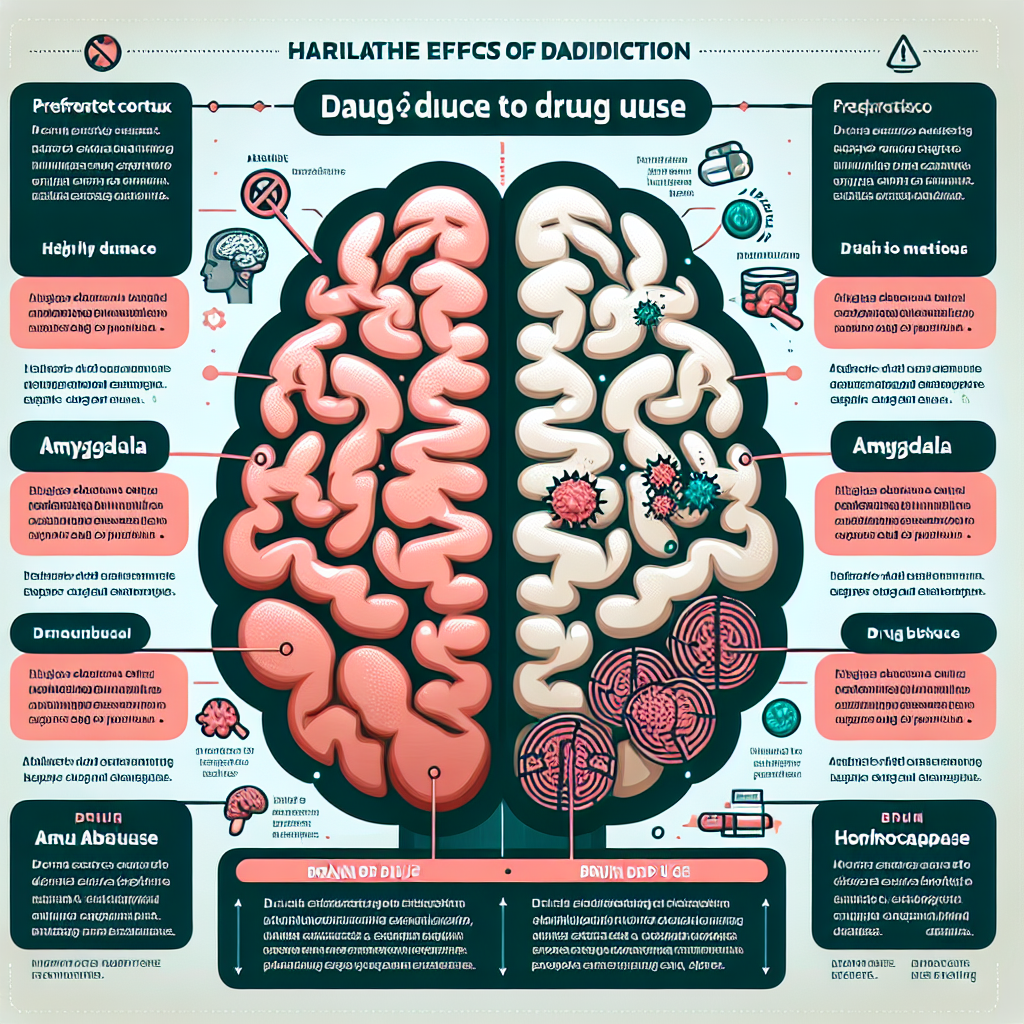-
Table of Contents

“Drug Addiction: The Path to Irreversible Brain Damage.”
Introduction
Drug addiction is a chronic, relapsing disorder characterized by compulsive drug seeking, continued use despite harmful consequences, and long-lasting changes in the brain. Research has shown that prolonged substance abuse can lead to significant and potentially permanent brain damage. The extent of this damage varies depending on the type of drug, the duration and intensity of use, and individual susceptibility. Drugs such as alcohol, methamphetamine, cocaine, and opioids can alter brain structure and function, impair cognitive abilities, and disrupt emotional regulation. These changes can result in long-term deficits in memory, decision-making, and behavior, underscoring the critical need for effective prevention and treatment strategies.
Long-Term Effects Of Drug Addiction On Brain Health
Drug addiction is a complex and multifaceted issue that affects millions of individuals worldwide. While the immediate consequences of substance abuse are often evident, the long-term effects on brain health can be both profound and enduring. Understanding these effects is crucial for fostering empathy, promoting recovery, and encouraging preventive measures.
The brain is an intricate organ, responsible for regulating emotions, decision-making, and overall cognitive function. When drugs are introduced into the system, they can disrupt the brain’s natural chemistry, leading to significant alterations in its structure and function. For instance, substances like cocaine, methamphetamine, and opioids can cause the brain to release excessive amounts of neurotransmitters such as dopamine. This surge creates the euphoric “high” that users seek but also sets the stage for dependency and addiction.
Over time, the brain’s reward system becomes hijacked by these substances, making it increasingly difficult for individuals to experience pleasure from everyday activities. This phenomenon, known as anhedonia, is a hallmark of addiction and can persist long after the individual has stopped using drugs. Moreover, chronic drug use can lead to the depletion of neurotransmitters, resulting in mood disorders such as depression and anxiety.
In addition to these chemical changes, drug addiction can cause structural damage to the brain. For example, prolonged use of methamphetamine has been shown to reduce the volume of gray matter in areas responsible for memory, emotion, and decision-making. Similarly, alcohol abuse can lead to the shrinkage of the hippocampus, a region critical for learning and memory. These structural changes can impair cognitive function, making it challenging for individuals to perform daily tasks or maintain employment.
However, it is essential to recognize that the brain possesses a remarkable ability to heal and adapt. Neuroplasticity, the brain’s capacity to reorganize itself by forming new neural connections, offers hope for recovery. While some damage may be permanent, many individuals can regain significant cognitive function through sustained abstinence and rehabilitation. Therapeutic interventions, such as cognitive-behavioral therapy and medication-assisted treatment, can support this healing process by helping individuals develop healthier coping mechanisms and restore balance to their brain chemistry.
Furthermore, lifestyle changes can play a pivotal role in brain recovery. Regular physical exercise, a balanced diet, and adequate sleep have all been shown to promote neurogenesis, the growth of new neurons. Engaging in mentally stimulating activities, such as reading, puzzles, or learning a new skill, can also enhance cognitive function and support brain health.
It is crucial to approach the topic of drug addiction with compassion and understanding. Stigmatizing individuals who struggle with substance abuse only serves to isolate them further and hinder their path to recovery. By fostering a supportive environment and providing access to comprehensive treatment options, we can help those affected by addiction reclaim their lives and improve their brain health.
In conclusion, while drug addiction can cause significant and sometimes permanent damage to the brain, recovery is possible. Through a combination of medical treatment, therapeutic support, and lifestyle changes, individuals can rebuild their cognitive function and lead fulfilling lives. By raising awareness about the long-term effects of drug addiction on brain health, we can inspire hope and encourage a more compassionate approach to this pervasive issue.
Understanding The Irreversible Brain Damage Caused By Drug Addiction
Drug addiction is a complex and multifaceted issue that affects millions of individuals worldwide. While the immediate consequences of substance abuse are often evident, the long-term effects, particularly on the brain, are less commonly understood. Understanding the irreversible brain damage caused by drug addiction is crucial for both prevention and recovery efforts. This knowledge not only underscores the importance of avoiding substance abuse but also highlights the potential for healing and resilience.
The brain is an incredibly adaptable organ, capable of remarkable feats of learning and memory. However, it is also vulnerable to the toxic effects of drugs. Substances such as cocaine, methamphetamine, heroin, and even alcohol can alter the brain’s structure and function in profound ways. These changes can lead to cognitive deficits, emotional instability, and behavioral issues that persist long after the drug use has ceased. For instance, chronic use of methamphetamine has been shown to cause significant damage to the brain’s dopamine system, which is critical for reward, motivation, and pleasure. This damage can result in long-term cognitive impairments and an increased risk of developing mental health disorders.
Moreover, the brain’s plasticity, while a source of its strength, also makes it susceptible to the rewiring effects of addictive substances. Drugs can hijack the brain’s reward system, leading to a cycle of dependence and compulsive behavior. Over time, this can cause structural changes in areas of the brain responsible for decision-making, impulse control, and emotional regulation. For example, prolonged alcohol abuse can lead to shrinkage of the brain’s frontal lobes, which are essential for executive functions such as planning, judgment, and problem-solving. This shrinkage can result in permanent deficits that affect an individual’s ability to function in daily life.
However, it is important to recognize that while some damage may be irreversible, the brain also has a remarkable capacity for recovery. Neuroplasticity, the brain’s ability to reorganize itself by forming new neural connections, offers hope for those in recovery. With the right interventions, such as cognitive-behavioral therapy, medication-assisted treatment, and lifestyle changes, individuals can regain some of the lost functions and improve their quality of life. For instance, studies have shown that abstinence from drugs, combined with a healthy lifestyle and mental health support, can lead to partial recovery of brain function over time.
Furthermore, the journey to recovery is not just about healing the brain but also about rebuilding one’s life. It involves reconnecting with loved ones, finding purpose, and developing new coping strategies. Inspirational stories of individuals who have overcome addiction and gone on to lead fulfilling lives serve as powerful reminders of the human spirit’s resilience. These stories highlight that while the road to recovery may be challenging, it is also filled with opportunities for growth and transformation.
In conclusion, drug addiction can indeed cause permanent brain damage, affecting cognitive functions, emotional stability, and behavior. However, understanding these effects underscores the importance of prevention and early intervention. It also highlights the potential for recovery and the brain’s remarkable ability to heal. By fostering a supportive environment and providing access to effective treatment, we can help individuals overcome addiction and reclaim their lives. The journey may be arduous, but with determination, support, and the right resources, recovery is not only possible but also a testament to the resilience of the human spirit.
Q&A
1. Can drug addiction cause permanent brain damage?
Yes, drug addiction can cause permanent brain damage by altering brain structure and function, leading to cognitive deficits, memory loss, and emotional disturbances.
2. Which drugs are most likely to cause permanent brain damage?
Drugs such as methamphetamine, cocaine, and opioids are most likely to cause permanent brain damage due to their neurotoxic effects and potential to induce severe neurological and psychological impairments.
Conclusion
Yes, drug addiction can cause permanent brain damage. Chronic use of addictive substances can lead to long-lasting changes in brain structure and function, affecting areas responsible for decision-making, behavior control, and emotional regulation. These alterations can result in cognitive deficits, memory problems, and increased vulnerability to mental health disorders, which may persist even after cessation of drug use.



